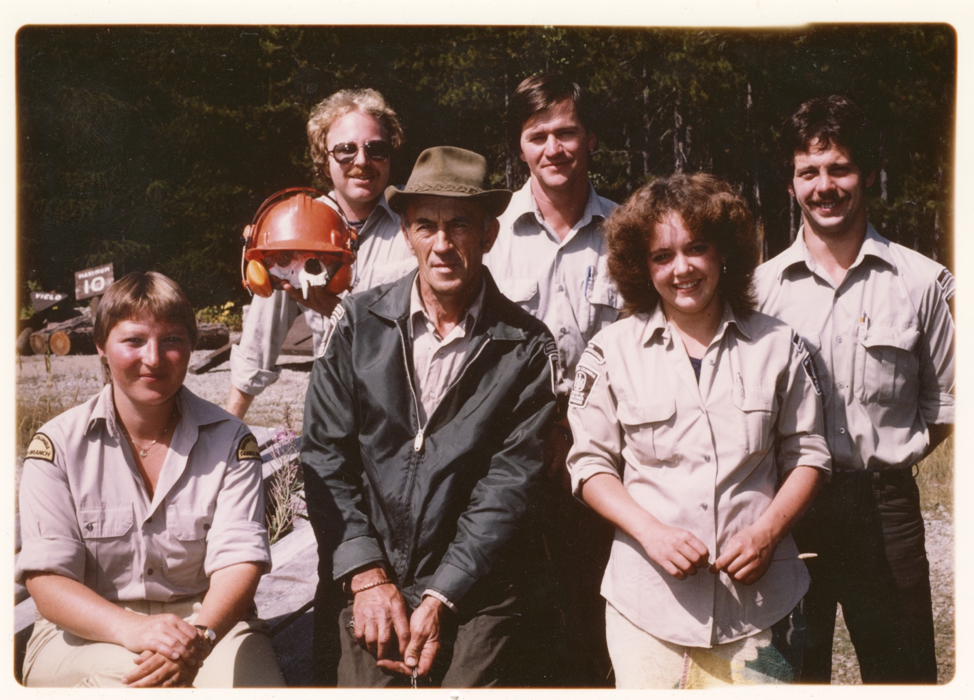By Nicole Ensing, Project Archivist
The Archives and Special Collections of the Whyte Museum of the Canadian Rockies has
acquired the personal papers and photographs of Douglas Leighton. Described as the premiere
landscape and nature photographer in the Rocky Mountains in the 90s, Leighton had a
distinguished photography career marked by his stunning portrayal of the Canadian wilderness
and its inhabitants, capturing iconic locations and sites around Canada.

Douglas Leighton was born on August 7, 1953, in Banff, Alberta, but soon moved with his family
to Penticton, British Columbia, when he was 10 years old. While in BC, Douglas became a
young naturalist and a keen birder through his teenage years in the Okanagan.

Leighton worked as a park naturalist with British Columbia Parks Branch starting in 1970. As a Park Naturalist, Leighton developed and led educational programs for schools, including photo presentations and tours with students. As seen in letters and drawings from participants, Leighton left a strong impression with the students.


While Leighton trained as Park Naturalist, he used his skills as a photographer to create and develop engaging programs for BC Park participants. Eventually, he worked to establish the importance of photography for interpretation programs in BC Parks, as seen in one of Leighton’s handouts for a training course.

After working for British Columbia Parks Branch for 10 years, Leighton eventually returned to Banff to pursue a professional photography career in 1985, a career in which he flourished. In 1989, a portfolio of his work was selected for the National Museum of Natural Science's The Nature of Photography exhibition, celebrating 150 years of photography in Canada. Leighton’s photographs have been featured in prestigious publications like the National Geographic Society, Audubon Society Books, Time-Life Books, Canadian Geographic, Nature Canada, Equinox, and British Columbia Outdoors magazines. He also authored several best-selling photography books, including The Canadian Rockies (1993), Alberta (1995), and Greater Vancouver (1981).

While Leighton’s iconic images in these books are standing the test of time, here I want to draw specific attention to his work as a writer and his photographs of birds, insects, and plants. Though he was no longer working for BC Parks, Leighton continued acting as a naturalist. A capable writer, Leighton skillfully provided deeper context and insight into his images in accompanying essays. Leighton's contributions to nature publications helped to raise awareness. For instance, writing for Nature Canada, Leighton carefully laid out the importance of controlled burns to forest management in Banff National Park. In an article for BC Nature Leighton informed readers of the functional importance of flowers. Articles like these two demonstrate Leighton’s dedication to education and sharing information of the natural world. His work gives the reader a deeper understanding and appreciation of the complexity of plants and animals.




Leighton not only photographed and wrote about different animal and plant species, he also participated data collection, including nest and bird counts, for conservations efforts. His stunning photographs serve as important documentation of the biodiversity of the regions he photographed. Many of the species he captured in his photos are now at risk, including mountain caribou, grizzly bear, western screech owl, and badger, which are now all listed as threatened or endangered species. Paired with his notes and essays, these photographs comprise a valuable resource for researchers studying these species going forward.
Gallery 1
Douglas Leighton’s work not only inspired photographers but also inspired many others to explore and appreciate the natural world, and his legacy continues to influence the world of nature and landscape photography and conservation to this day. Accordingly, his photographs and literature, now held in the Archives and Special Collections at the Whyte Museum of the Canadian Rockies will continue to provide an important historical record of the plants, wildlife and research from British Columbia and Alberta, including the Rocky Mountain regions.
You can view Leighton’s photographs and literature in the archives and special collections by making an appointment to visit or you can view a selection of his work that has been digitized and is available online at archives.whyte.org.
The Archives are open for research appointments from Tuesday to Friday. E-mail archives@whyte.org to schedule your appointment today.
Gallery 1:
Image 1:Caribou, 1996, Douglas Leighton/photographer. Whyte Museum of the Canadian Rockies, Douglas Leighton fonds (V222/II/A/4/NS-76)
Image 2: Arctic fox, 1984, Douglas Leighton/photographer, Whyte Museum of the Canadian Rockies, Douglas Leighton fonds (V222/II/D/1/NS-108)
Image 3: Red Crossbill on ponderosa pine, Okanagan Valley, BC, 1983, Douglas Leighton/photographer, Whyte Museum of the Canadian Rockies, Douglas Leighton fonds (V222/II/C/2/NS-32)
Image 4: Harvestman, 1982, Douglas Leighton/photographer, Whyte Museum of the Canadian Rockies, Douglas Leighton fonds (V222/II/B/1/NS-32)
Image 5: Queen cup (Clintonia uniflora), 1981, Douglas Leighton/photographer. Whyte Museum of the Canadian Rockies, Douglas Leighton fonds (V222/V/6/NS-18)











Comments